As technology evolves, so do the questions surrounding data privacy and legality. The rise of AI language models like ChatGPT has ignited discussions about the collection, storage, and utilization of user data. With concerns mounting over digital privacy, it’s crucial to delve into the legality of ChatGPT’s data usage and its implications for users.

Understanding ChatGPT and Data Usage
ChatGPT, developed by OpenAI, is a powerful language model designed to generate human-like text responses based on the input it receives. The model has undergone extensive training on a diverse range of internet text, which enables it to generate coherent and contextually relevant responses. However, this training process relies on vast amounts of text data from the internet, which raises questions about the origin and usage of that data.
Data Privacy and Consent
One of the primary concerns when it comes to data usage is user consent. Individuals should have a clear understanding of how their data is being collected, processed, and used. With ChatGPT, the data used for training is largely harvested from publicly available sources on the internet. This data often includes text from websites, forums, and other online platforms.
The legality of using publicly available data in AI training largely depends on the terms and conditions set by the platforms hosting the data. If the data is publicly accessible and not subject to any specific restrictions, using it for training purposes may be legally permissible. However, there are instances where even publicly available data could be subject to copyright or intellectual property rights, raising legal questions about its use.
User-Generated Content and Intellectual Property
Many internet platforms, including social media, blogs, and forums, contain user-generated content. This content is often protected by copyright, and users typically retain ownership of what they post. When AI models like ChatGPT use this content for training, the question arises: does the user retain ownership, and how does that ownership relate to the data’s subsequent use in AI-generated responses?
While many platforms include clauses in their terms of service that grant them broad rights to use and distribute user-generated content, the situation becomes more complex when the content is used for commercial purposes, such as training AI models. Users might not be fully aware of how their content is being repurposed, leading to discussions about transparency, consent, and potential legal implications.
Ethical Considerations and Informed Consent
Even if data usage is legal, ethical considerations play a significant role in determining whether data usage is appropriate. Transparent communication and informed consent are crucial aspects of ethical data usage. Users should be informed about how their data will be used and have the option to opt out if they are uncomfortable with their data being included in AI training.
OpenAI has taken steps to address these concerns by implementing ethical guidelines and considering user feedback. Their commitment to responsible AI development includes minimizing biases, ensuring transparency, and striving to provide users with greater control over their interactions with AI models.
Regulatory Frameworks and Evolving Laws
The landscape of data privacy and usage is continually evolving. Governments and regulatory bodies worldwide are enacting laws and regulations to safeguard user data and privacy. For example, the General Data Protection Regulation (GDPR) in the European Union and the California Consumer Privacy Act (CCPA) in the United States impose strict requirements on how organizations handle personal data.
However, AI models like ChatGPT, which draw from a wide range of publicly available data, might not fall directly under the purview of these regulations. This raises questions about whether existing laws are comprehensive enough to address the intricacies of data usage in the AI era.
Conclusion: Navigating the Data Usage Landscape
The legality of ChatGPT’s data usage hinges on a complex interplay of factors, including the source of the data, user consent, copyright considerations, and evolving legal frameworks. While publicly available data is a cornerstone of training AI models, responsible data usage requires careful consideration of ethical principles and user rights.
As technology continues to advance, society’s understanding of data privacy and the legal and ethical implications of AI models like ChatGPT will likely evolve as well. Striking a balance between innovation and protecting user rights remains a pressing challenge that requires ongoing dialogue, collaboration, and proactive efforts by both developers and regulatory bodies.